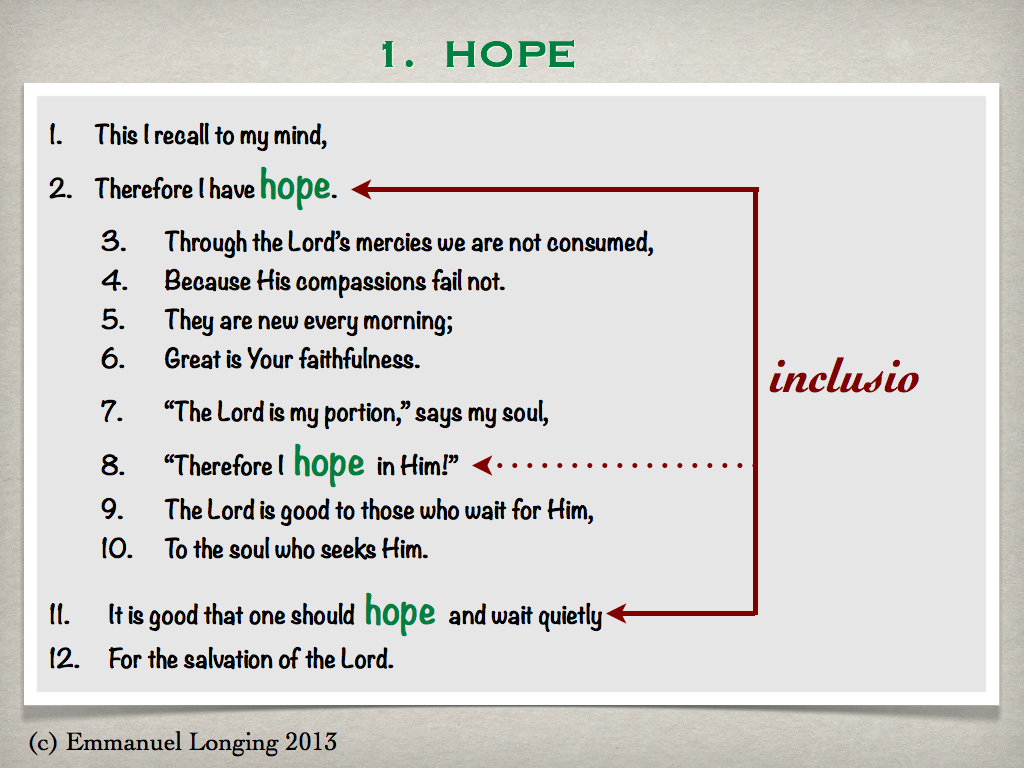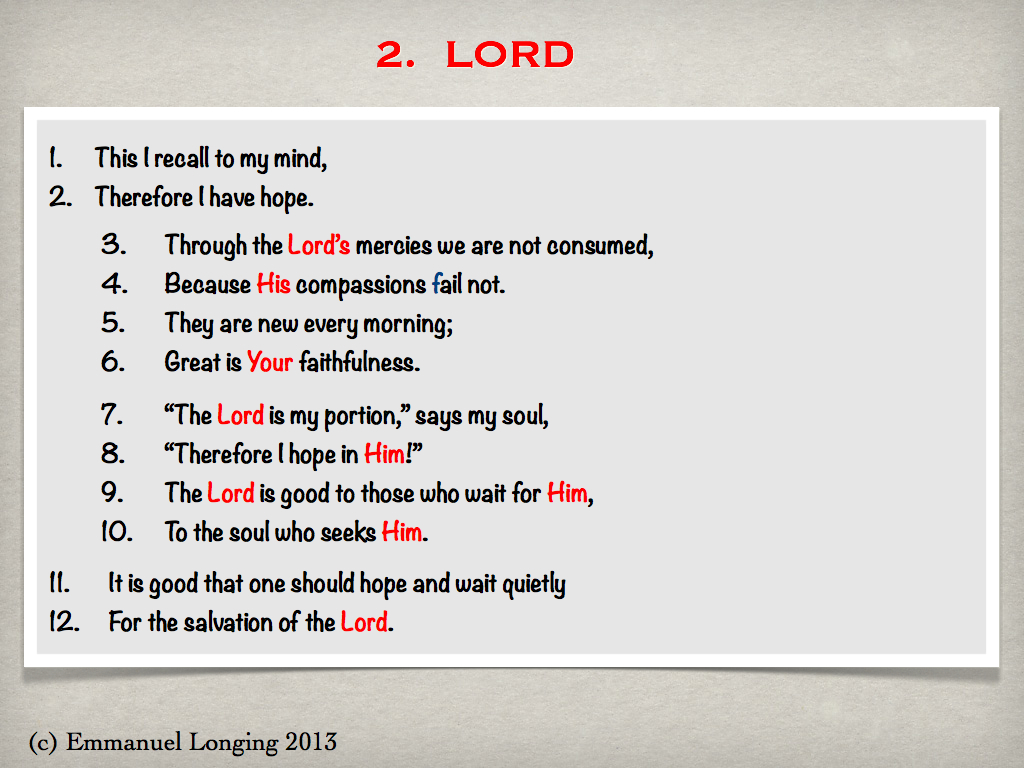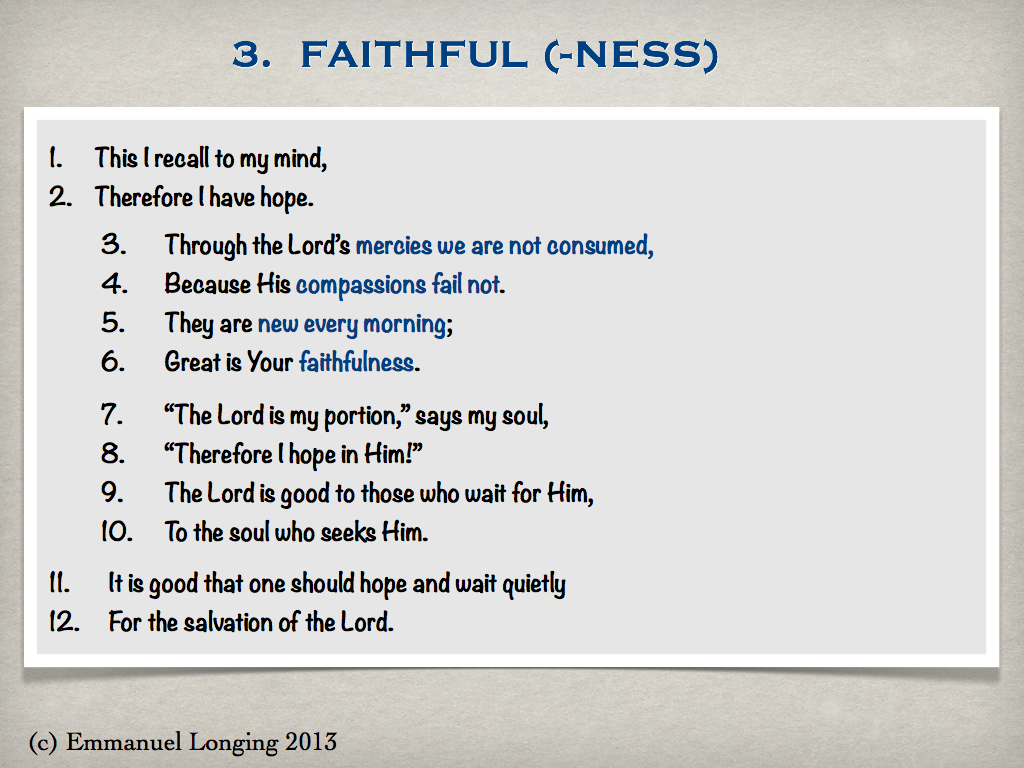Returning to our 12 line poetic passage, we want to focus on four special words that occur there. First is “hope:” Inclusio is a term used for analyzing poetic passages. In general, it means that something ‘bookends’ or creates an envelope for the included lines. This ordinarily tells us something important about the big theme of the passage. A classic inclusio example comes from the opening of the Book of Ecclesiates (1:2):
Inclusio is a term used for analyzing poetic passages. In general, it means that something ‘bookends’ or creates an envelope for the included lines. This ordinarily tells us something important about the big theme of the passage. A classic inclusio example comes from the opening of the Book of Ecclesiates (1:2):
“Vanity of vanities,”
says the Preacher;
“Vanity of vanities, all is vanity.” NKJV
Other translations, such as the NIV, use “meaningless” instead of vanity, which is probably a more relevant term. Clearly in the Ecclesiates example we see the doubling (repetition) in both the opening and third lines, making the inclusio particularly emphatic. And of course vanity / meaninglessness (under the sun) is the over-arching theme of the entire Book of Ecclesiastes. So this emphatic inclusio structure in the second verse of the Book is a giant beacon for the reader as to the thought journey about to be embarked upon.
In our above example of the 12-line passage, the inclusio is simpler, but clear: the theme of the passage is “Hope.” (Later, when we study the context of its writing, we’ll see how important, and comforting, the idea of “hope” is).
Our second word is Lord: The word translated “Lord” is of central importance in both the Old and New Testaments. In the Hebrew Old Testament “Lord” translates the sacred four-consonant original word “YHWH,” known as the Tetragrammaton (meaning four letters). Some translations of the Hebrew into English perform a transliteration of YHWH inserting best-guess vowels making the English either “Jehovah” or “Yahweh.”
The word translated “Lord” is of central importance in both the Old and New Testaments. In the Hebrew Old Testament “Lord” translates the sacred four-consonant original word “YHWH,” known as the Tetragrammaton (meaning four letters). Some translations of the Hebrew into English perform a transliteration of YHWH inserting best-guess vowels making the English either “Jehovah” or “Yahweh.”
At the time of Christ the more widely read and used Old Testament was a then ca. 200 year old translation of the Hebrew into Greek. This translation is known today as the Septuagint (because of the tradition that 70 Hebrew-Greek scholars performed the translation) and referred to as LXX, deriving from Roman numerical symbols of the number 70. In the Septuagint the Hebrew Tetragrammaton (YHWH) is translated into Greek as “kurios.” The Greek root of kurios is “kuros” meaning “supreme.” Accordingly, kurios is translated into English by the word shown in the above poetic passage: Lord. (In many typeset translations “Lord” is presented in small caps to highlight its special status and meaning).
Why is this significant? Here’s why:
1. The word YHWH (and Lord in English translations) occurs more than 6,000 times in the Old Testament, or about every fourth verse. It occurs even many more times by the use of personal pronoun references as shown in the chart above with “your” and “Him.” There is no known magical significance to word frequency counts, such as some hidden meaning in the number. However, when a particular word is used many thousands of times we have an obvious alert that it conveys an important idea sweeping across the entire Biblical story, and here specifically an important, actually the central, Actor-Initiator.
2. Space does not permit us even to survey all the roles / Acts of YHWH (Lord) in the Old Testament. But here are a few foundational events:
- YHWH / Lord is God in the Garden of Eden with Adam and Eve, and upon their disobedience, pronounces their judgment, clothes them, and casts them out.
- YHWH / Lord calls Noah out of the antedeluvian world into the Ark (ship).
- YHWH / Lord calls Abram our of his homeland in Ur of the Chaldees to a Promised Land and Fatherhood (to become Abraham, meaning the father of a multitude).
- YHWH / Lord appears to Moses in the desert wilderness to command him to extract the people belonging to YHWH / Lord out of their slavery in Egypt (and self-identifies Himself as the self-existing “I AM”).
3. In the New Testament, which was written in Greek, the word “kurios” is used repeatedly to characterize Jesus Christ such that we commonly refer to Him as The Lord Jesus Christ. Parsing such name, “Jesus” is a reference to His earthly given name, which is the English expression of the Hebrew “Joshua” meaning “YHWH is salvation,” Christ is the Greek word for the Hebrew word “Messiah” (Who was the promised redeeming One), and “Lord” is a direct reference to the word YHWH itself.
Now let’s turn to our third word: faithful (or faithfulness). Hope is something we possess based upon something real. That reality is founded on a Person–the Lord–and that Person’s character / work. As we will study later, faithfulness is a key attribute of the Lord. The Biblical record gives us many examples of such faithfulness on the part of God. “Faith” is another world of great importance. It is frequently used in the New Testament in all its various forms: faith, believe (the English verb form of “faith”), faithful (adjective), and faithfulness (adverb). We of course have the common every day phrase of “The Christian Faith” referencing us who hold to the New Testament’s teaching about the Person and Work of the Lord Jesus Christ.
“Faith” is another world of great importance. It is frequently used in the New Testament in all its various forms: faith, believe (the English verb form of “faith”), faithful (adjective), and faithfulness (adverb). We of course have the common every day phrase of “The Christian Faith” referencing us who hold to the New Testament’s teaching about the Person and Work of the Lord Jesus Christ.
However, in the above poetic passage the reference to “faith” is not to us or our ancient Jewish believing brothers. In this passage the faith references shown above are to the Lord. Such use is not how we often apply the meaning of the root word of “faith.” In everyday life “faith” is used of an expectation, something more probable than a “wish” or “hope,” but far short of a condition of absolute certainty. However, when “faith” is used of God it means exactly a certain outcome, but not necessarily on a timetable corresponding to our human expectation. Let us drill further into what the Faithfulness of God means.